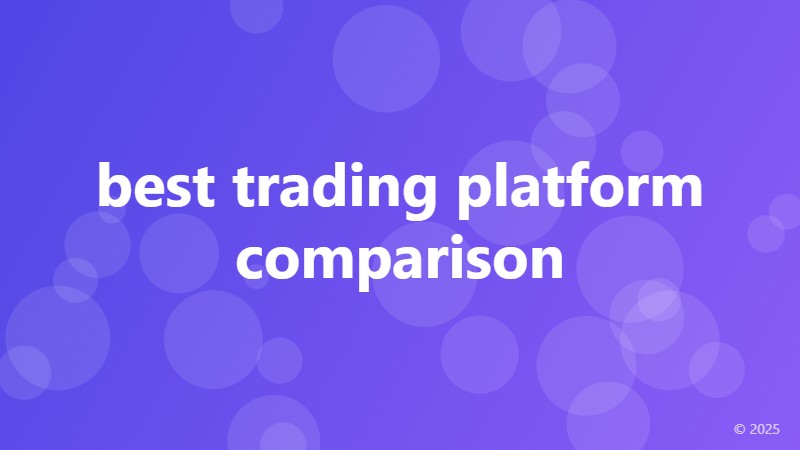best trading platform comparison

What to Look for in a Trading Platform
Choosing the best trading platform can be a daunting task, especially for beginners. With so many options available, it's essential to know what to look for to ensure you find a platform that meets your needs. In this article, we'll provide a comprehensive comparison of the top trading platforms, highlighting their key features, pros, and cons, to help you make an informed decision.
Top Trading Platforms Compared
We've compiled a list of the most popular trading platforms, featuring a mix of established players and new entrants. Here's a breakdown of each platform's strengths and weaknesses:
eToro
eToro is a well-known platform that offers a user-friendly interface, making it ideal for beginners. It provides access to a wide range of markets, including stocks, commodities, and cryptocurrencies. eToro's social trading feature allows users to follow and copy the trades of experienced investors, making it an excellent choice for those new to trading.
Pros: User-friendly interface, social trading feature, low minimum deposit requirement
Cons: Limited research tools, high fees for certain trades
MetaTrader
MetaTrader is a popular platform among experienced traders, offering advanced technical analysis tools and customizable indicators. It's widely used for forex trading, but also supports other markets. MetaTrader's backtesting feature allows users to test their strategies on historical data, making it an excellent choice for those who want to refine their trading skills.
Pros: Advanced technical analysis tools, customizable indicators, backtesting feature
Cons: Steep learning curve, not suitable for beginners
Key Features to Consider
When choosing a trading platform, there are several key features to consider:
Security: Look for platforms that offer robust security measures, such as two-factor authentication and encryption.
Fees and Commissions: Be aware of the fees associated with trading, including commission rates, spreads, and overnight fees.
Research Tools: Consider the quality and availability of research tools, such as charts, indicators, and news feeds.
Customer Support: Evaluate the platform's customer support, including availability, response times, and quality of assistance.
Conclusion
Choosing the best trading platform depends on your individual needs and goals. By considering the key features outlined above and weighing the pros and cons of each platform, you can make an informed decision. Remember, the best trading platform for you is one that provides the tools and support you need to succeed in the markets.
Take your time, do your research, and don't be afraid to try out different platforms before committing to one. Happy trading!